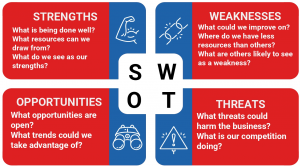About this Strengths, Weaknesses, Opportunities, Threats Analysis
SWOT stands for strengths, weaknesses, opportunities and threats.
This SWOT analysis provides a great framework and can be used to evaluate current and future operations and to help you develop strategic goals.
What is SWOT Analysis?

A SWOT analysis is a process for identifying and analyzing strengths and weaknesses and opportunities and threats of such things as political, economic, social and technological aspects.
Elements of a SWOT analysis will typically assess the following:
Strengths
What is being done well?
What resources can we draw from?
What do we see as our strengths?
Things to consider include:
- Advantages of business strategy proposition.
- Capabilities of the planning process.
- Competitive advantages.
- Decision-making process.
- Customer services.
- Exclusive selling points.
- Resources, Assets, People.
- Human resources.
- Experience, knowledge, data.
- Financial reserves, likely returns.
- Marketing – reach, distribution, awareness.
- Innovative aspects.
- Location and geographical.
- Price, value, quality.
- Accreditations, qualifications, certifications.
- Processes, systems, IT, communications.
- Cultural, attitudinal, behavioral.
- Management cover, succession.
- Philosophy and values.
Weaknesses
What could we improve on?
Where do we have fewer resources than others?
What are others likely to see as a weakness?
Things to consider include:
- Disadvantages of a proposition.
- Gaps in capabilities.
- Lack of competitive strength.
- Reputation, presence and reach.
- Financials.
- Own known vulnerabilities.
- Timescales, deadlines and pressures.
- Cashflow, start-up cash-drain.
- Continuity, supply chain robustness.
- Effects on core activities, distraction.
- Reliability of data, plan predictability.
- Morale, commitment, leadership.
- Accreditations, etc.
- Processes and systems, etc.
- Management cover, succession.
Opportunities
What opportunities are open?
What trends could we take advantage of?
How can we turn our strengths into opportunities?
Things to consider include:
- Market developments.
- Competitors’ vulnerabilities.
- Industry or lifestyle trends.
- Technology development and innovation.
- Business planning.
- PEST analysis.
- Global influences.
- New markets, vertical, horizontal.
- Strategic planning for niche target markets.
- Geographical, export, import.
- Tactics: e.g. surprise, major contracts.
- Business and product development.
- Information and research for identified opportunities.
- Partnerships, agencies, distribution.
- Internal and external factors with small businesses.
- Volumes, production, economies.
- Seasonal, weather, fashion influences.
Threats
What threats could harm the business?
What is our competition doing?
What threats do our weaknesses expose us to?
Things to consider include:
- Political effects.
- Legislative effects.
- Environmental effects.
- External environment.
- IT developments with new team members.
- Competitor intentions – various.
- Market demand.
- New technologies, services, ideas.
- Vital contracts and partners.
- Sustaining internal capabilities.
- Obstacles faced.
- Insurmountable weaknesses.
- Loss of key staff.
- Sustainable financial backing.
- Economy – home, abroad.
- Seasonality, weather effects.
Creating a SWOT analysis is a great way to assess a planned strategy to define strengths and weaknesses and brainstorm ideas.
Often a SWOT analysis will reflect factors a work group were previously unaware of and would never have captured, if not for conducting the SWOT analysis. A SWOT can be used to help you make better decisions about your business.
Why Become a Member of Redcat Safety and Download this Strengths Weaknesses Opportunities Threats Analysis?
- Completing a SWOT analysis is a powerful way to assess a company’s competitive position and develop strategies for future success.
- This SWOT can be developed into an invaluable tool for businesses to be able to identify their strengths and weaknesses, as well as opportunities and threats. By understanding these elements, businesses can create plans to improve their overall performance and profitability.
After downloading this strengths, weaknesses, opportunities, threats analysis you will be able to:
- Very easily edit and customize the template to create your own strengths weaknesses opportunities threats analysis.
- Apply your own style, format and brand to the SWOT analyses.
- Use it in any industry or sector regardless of size or type of organization.
Availability and Use of this Strengths, Weaknesses, Opportunities, Threats Analysis
- This SWOT analysis template is accessible to you right now by clicking the ‘Become a Member Now’ button.
- The SWOT analysis will be delivered to you in fully editable Microsoft Word format for immediate and full use in your business.
- There are no membership auto-renewals, contracts or ongoing costs.

If you can find HSEQ resources that are of better value than what your Redcat Safety Membership offers, we will REFUND YOU double the cost of your membership.

